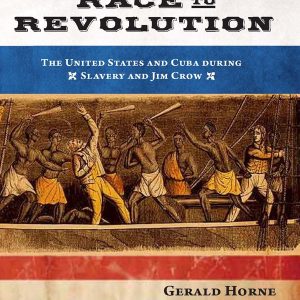BOOK TALK with Dr. Gerald Horne
Race to Revolution: The U.S. and Cuba during Slavery and Jim Crow
Friday, July 25 at 7 pm
New Haven Peoples Center
37 Howe Street
New Haven, CT
Presented as a project of People’s World Friday Night
Film & Discussion Series
For more information please contact ct-pww[at]pobox.com
“Pathbreaking … Their story is our story, and thanks to Horne, we can now study its flow in a single, and profound, narrative.”
—Henry Louis Gates, Jr., Alphonse Fletcher University Professor, Harvard University
“Gerald Horne is one of our most original historians.”
—Ishmael Reed, John D. MacArthur Fellow
“Horne is in the forefront of historians laboring to revise the entire story of the Americas until the broken pieces are mended.”
—Tom Hayden, author, Inspiring Participatory Democracy
“A very much welcome and important contribution to the scholarship on the workings of trans-national systems.”
—Louis A. Pérez, Jr., University of North Carolina at Chapel Hill
Paper ISBN: 978-1-58367-445-1
Cloth ISBN: 978-1-58367-446-8
Forthcoming in June 2014
The histories of Cuba and the United States are tightly intertwined and have been for at least two centuries. In Race to Revolution, historian Gerald Horne examines a critical relationship between the two countries by tracing out the interconnections among slavery, Jim Crow, and revolution. Slavery was central to the economic and political trajectories of Cuba and the United States, both in terms of each nation’s internal political and economic development and in the interactions between the small Caribbean island and the Colossus of the North.
Horne draws a direct link between the black experiences in two very different countries and follows that connection through changing periods of resistance and revolutionary upheaval. Black Cubans were crucial to Cuba’s initial independence, and the relative freedom they achieved helped bring down Jim Crow in the United States, reinforcing radical politics within the black communities of both nations. This in turn helped to create the conditions that gave rise to the Cuban Revolution which, in 1959, shook the United States to its core.

Comments are closed.